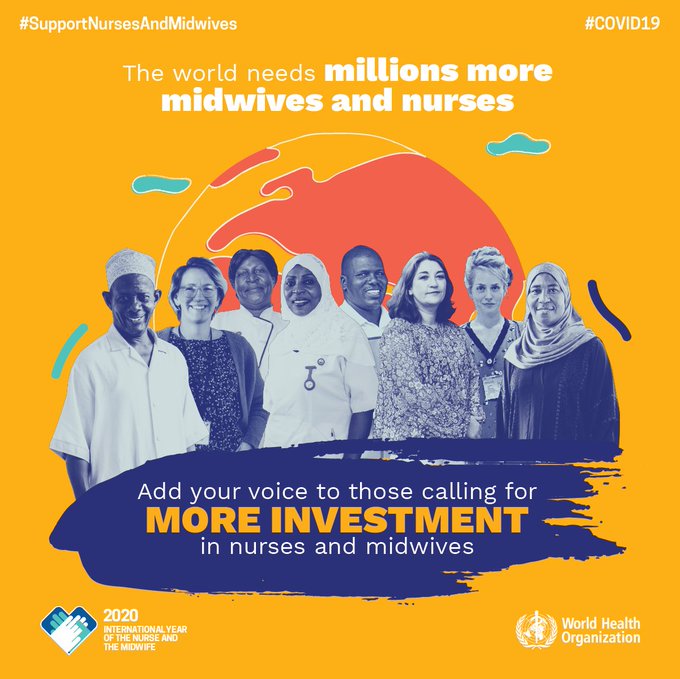Amidst COVID-19 pandemic, World Health Day 2020 puts nurses, midwives on the spotlight
The World Health Day is commemorated every April 7 to raise awareness about health issues and mobilize support for action, from local community to the international stage. April 7 also marks the date of the founding of the World health Organization (WHO) – the specialized agency of the United Nations responsible for international public health, founded in 1948.

The 2020 commemoration theme is: “Year of the Nurse and Midwife”, in honour of the 200th birth anniversary of Florence Nightingale, the British founder of modern nursing. It is also meant to celebrate the efforts of all nurses and midwives in their vital role of providing healthcare services and saving lives, particularly amidst the ongoing COVID-19 pandemic.
“Nurses and other health workers are at the forefront of COVID-19 response – providing high quality, respectful treatment and care, leading community dialogue to address fears and questions and, in some instances, collecting data for clinical studies. Quite simply, without nurses, there would be no response,” says the WHO.
This year’s commemoration also saw the launch of the first-ever State of the World’s Nursing Report 2020, which highlights the current status of nursing and support evidence-based planning to optimize the contributions of the nursing workforce in improving the health and wellbeing of all. “The report will set the agenda for data collection, policy dialogue, research and advocacy, and investment in the health workforce for generations to come,” says the WHO.
The 2020 World Health Day comes at the peak of the new cornonavirus disease pandemic, which has infected over 1.4 million and killed over 80,000 others, as at April 7. It would be recalled that on December 31, 2019, the Health Commission of Hubei Province in People’s Republic of China, had announced a cluster of unexplained cases of pneumonia. The pneumonia cases were later found to have been caused by the 2019 novel coronavirus (2019-nCoV).
The COVID-19 pandemic brought unprecedented challenges to the global healthcare community, with rapid escalation of the number of affected individuals and associated fatalities, countries of the world struggled to minimize its negative health consequences, using the best available scientific advice and evidence to contain the virus, delay its spread, and mitigate its effect on those already infected.
As a precautionary measure against the increasing number of COVID-19 cases, schools were closed, conferences and mass gatherings cancelled, and mobility of people restricted, while many businesses were closed down. These measures were taken alongside implementation of the WHO’s recommendations asking people to wash their hands frequently; as well as avoid touching their eyes, nose, and mouth.
WHO also recommended that people covered their mouth and nose with a tissue when sneezing or coughing and then dispose of the tissue immediately; keeping an interpersonal distance of at least two meters between people as well as using a face mask in the presence of people suspected or confirmed to have contracted the virus.
As the blunt reality of this pandemic continue to manifest, one can imagine the challenges being faced by nurses, midwives and other health personnel working in the front line of the fight against this outbreak – some of whom have made the supreme sacrifice fighting COVID-19. According to a study published by the medical journal Lancet, at the frontline of the war against COVID-19 in China’s Hubei province, 70% of health workers suffered extreme levels of stress, 50% had depressive orders, while 44% and 34% had anxiety and insomnia, respectively.
In Italy, forty-one health workers had died from coronavirus since the outbreak of COVID-19 in the country; the virus has also infected more than 5,000 doctors, nurses, technicians, ambulance staff and other health employees who are at the frontline of the campaign against the disease.
“The problem is that when this storm hit us we were unprepared, perhaps ignoring what might have been the consequences. Some of the dead were doctors who died at the beginning of the emergency, when we knew nothing about this storm,” Roberto Stellini an infectious diseases surgeon at Poliambulanza hospital in Brescia, told the UK Guardian.
Similarly, Anna, a doctor in Lombardy, said the mental torment worried her more than physical fatigue. “We are working in a context I never imagined as a doctor,” she said. “But when you see Covid-19 patients, above all when you see how they die, in complete solitude, then you forget about your own fatigue. Each doctor also has a personal situation of their own. For example, I have not seen my children for five weeks,” she said.
For sure, no one knows when this pandemic will end, but it’s probably not anytime soon. The longer it stays, the longer health workers will have to keep up with the precarious and dangerously difficult task of attending to the health needs of COVID-19 patients. All we can do for them is ensure they never lack all necessary equipment, most importantly, the personal protective equipment (PPE).









